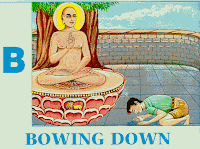So in the last post i just gave u ahint of lkaras right yes ofcourse we are just going ahead in the same topic it is really very intresting topic among everything that is nothing but tence yes yes ofcourse the tences so lets learn below some basic introduction on the above mentioned topic
General introduction to the tenses.
In Sanskrit, verbs are associated with ten different
forms of usage. Of these six relate to the tenses and
four relate to moods. We shall examine the usages
now.
Six tenses are identified as follows. The tenses
directly relate to the time associated with the
activity specified in the verb, i.e., whether the
activity referred to in the verb is taking
place now or has it happened already or if it
will happen or going to happen etc.
Present tense: वर्तमान कालः
There is only one form for the present tense.
Past tense: भूत कालः
Past tense has three forms associated with it.
1. Expressing something that had happened sometime
in the recent past, typically last few days.
2. Expressing something that might have just happened,
typically in the earlier part of the day.
3. Expressing something that had happened in the distant
past about which we may not have much or any
knowledge.
Future tense: भविष्यत कालः
Future tense has two forms associated with it.
1. Expressing something that is certainly going to happen.
2. Expressing something that is likely to happen.
------Verb forms not associated with time.
There are four forms of the verb which do not relate
to any time. These forms are called "moods" in the
English language. English grammar specifies threemoods which are, Indicative mood, Imperative mood
and the Subjunctive mood. In Sanskrit primers one
sees a reference to four moods with a slightly
different nomenclature. These are, Imperative mood,
potential mood, conditional mood and benedictive
mood. Since the nomenclature differs we will have
to see what the moods in Sanskrit actually refer to.
The ten forms of usage of the verb are each given a
name in Sanskrit and all the names start with the
akshara l. Hence the forms are called the ten "lakaras"
(Even though two of the forms do not strictly start
with l , the term lkara: applies)
1. लट Present tense
2. लङ्ग् Past tense - imperfect
3. लुङ्ग् Past tense - aorist
4. लिट् Past tense - perfect
5. लुट् Future tense - likely
6. लृट्Future tense - certain
7. लृङ्ग् Conditional mood
८ विधिलिङ्ग् . Potential mood
9. आशिर्लीङ्ग् Benedictive mood
10. लोट् Imperative mood
so wasn't that interesting dear friends, hmmm so this is just an introduction to lakaras lets learn more on each kind of lakaras no no don't worry not now but in nxt post becoz i know it is a bit difficult..... so to learn sanskrit u need to learn this and all the upcoming notes very thoroughly.















